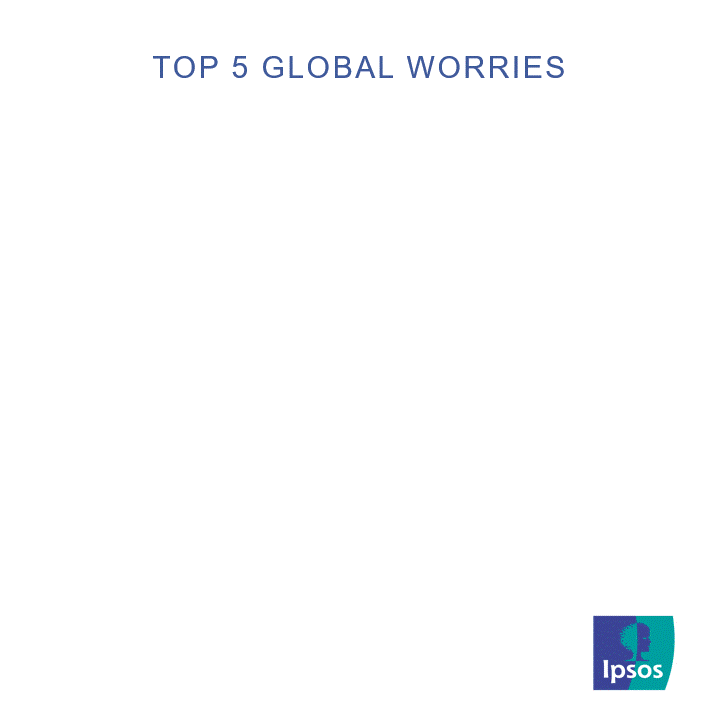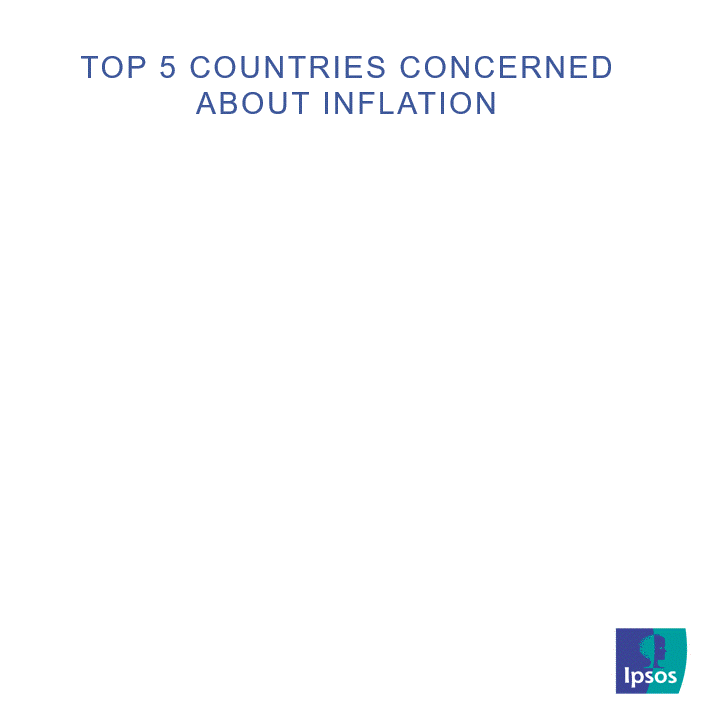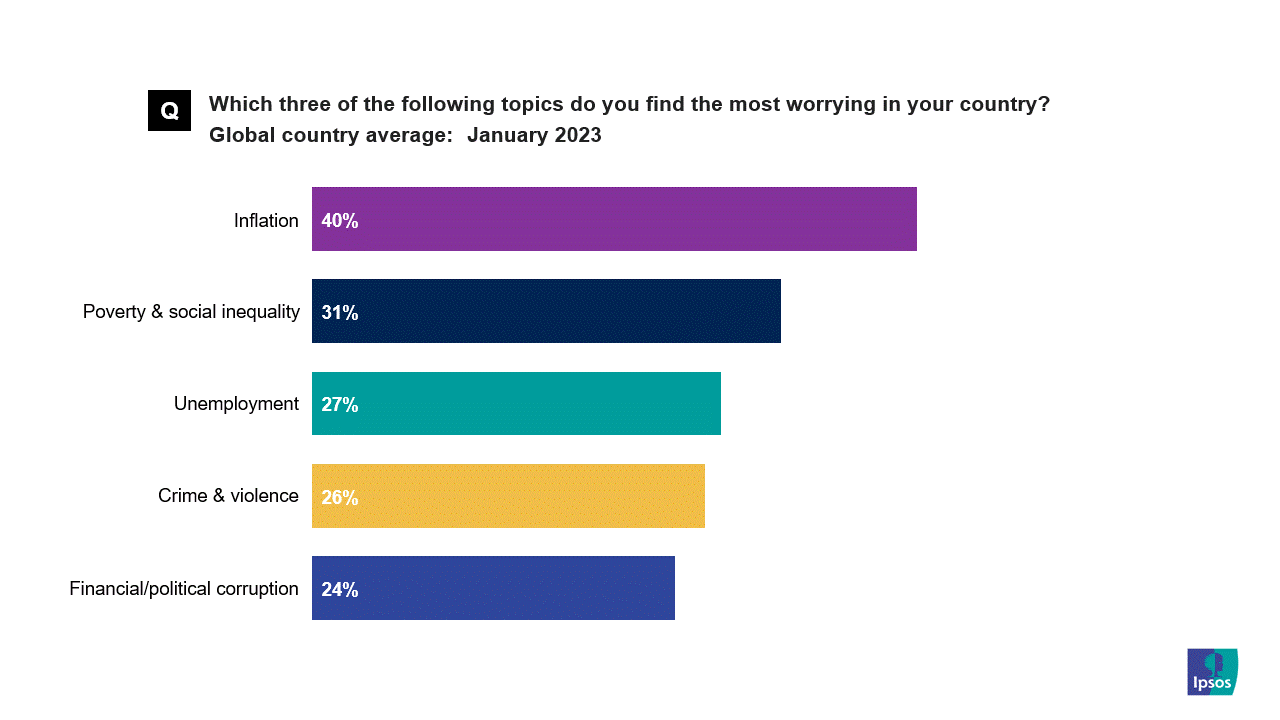What Worries the World – April 2023
Rising prices are a concern for four in 10 (41%) people, on average across 29 countries.
Our monthly What Worries the World survey explores what the public thinks are the most important social and political issues, drawing on more than ten years of data to place the latest scores in context. This wave was conducted between March 24th – April 7th, 2023.

Key findings
- Inflation is still the highest concern this month. However, continuing from last month, we see levels of worry stabilising, albeit at a historically high level. This month it is mentioned by 41%, down 1pp.
- Thirteen nations – Argentina, Australia, Canada, Colombia, France, Germany, Great Britain, Poland, Singapore, South Korea, Spain, Turkey, and the US - have rising prices as their biggest concern.
- Across all countries, worry about inflation is followed by poverty & social inequality (32%), crime & violence (30%), unemployment (27%) and financial & political corruption (27%) which together make up the top five global worries.
- Military conflict between nations remains 12th on our list. Poland (31%) is the most worried country by a significant margin, with Japan and Germany (both 20%) behind.
- Coronavirus worry has fallen again, dropping to 17th out of 18, with less than one in 10 (6%) picking it.
- Almost two-thirds (64%) believe their country is heading in the wrong direction, which is a 2pp rise from last month.
- Argentina (90%) and South Africa (89%) are the most pessimistic nations, with both Argentina’s wrong direction score rising 2pp and South Africa’s score rising 6pp from January.
Inflation

Four in 10 (41%) choose inflation as one of the biggest issues affecting their country. April’s figure is 1pp lower than last month. Argentina is the most concerned country and this month’s score of 71% is the equal-highest ever level of worry about rising prices in What Worries the World. (The other occasion being last August, when 71% of Argentinians said inflation was one of the top concerns affecting the country). The rest of the top five “most concerned about inflation” have all seen their level of worry fall in April. Poland down 3pp, Turkey 8pp, Canada 5pp, and France 2pp. The US, currently the sixth most worried nation about inflation, saw their level of concern rise 5pp.
Climate change
Against the backdrop of Earth Day, climate change is the seventh biggest concern in our What Worries the World survey, up one place from last month. Sixteen percent across 29 markets choose climate change as one of the biggest issues affecting their country.
The Netherlands is the most worried country about climate change, with three in 10 picking it as a worry (+4pp). Australia (28%), Germany (28%), France (26%), and Canada (25%) round out the top five. However, climate change is not the number one concern in any country.
Israel is the least concerned about climate change, with only one in 50 (2%) choosing it as an issue. Argentina ranks 28th out of 29 countries for concern about climate change, with 4% picking it as a worry.
Military conflict between nations
Military conflict between nations ranks 12th out of 18 issues in the survey.
One in 11 (9%) pick it as one of the three biggest concerns affecting their country this month.
In April 2023, Poland is the most concerned country about military conflict, with almost one in three (31%) choosing it as a worry.
This month is the first time Germany isn’t in the top two most concerned countries about this issue since it was added to What Worries the World in April 2022.
Japan is now second with one in five (20%) choosing it as one of the biggest issues affecting the country.
Coronavirus
The global public ranks coronavirus 17th out of 18 issues affecting their country. Only one in 20 (6%) pick the pandemic as one of their country’s most pressing concerns.
The decline in worry about the pandemic has been sharp. In February 2022, one in three globally (33%) said coronavirus was a top issue affecting their country. By April 2022, this had fallen to 18% and that figure stood at 13% at the start of 2023.
Now 13% is the highest level of worry we see in any country. In both Malaysia and Japan, 13% pick the pandemic as a top worry.
In three countries – Hungary, Argentina and South Africa – only 1% choose it as a concern.
Poverty & social inequality
One in three (32%) across 29 countries pick poverty and social inequality as one of the biggest issues affecting their country. April’s figure is up 1pp on last month.
Inequality was the top out of 18 worries in March 2022, but since then inflation has been the number one concern, with inequality in second place.
Indonesia is now the most concerned country when it comes to inequality, with one in two (49%) choosing it as an issue (+8pp).Turkey has seen the biggest increase in their level of worry this month, up 17pp, ahead of its elections in May.
Looking at how things have changed over the last 12 months, in April 2022 Colombia was the most worried country on inequality with (44%). Now 37% choose it as an issue.

Satisfaction with the economy
On average across 29 countries, one third of people describe their country’s current economic situation as “good”. Positivity is particularly prevalent in Southeast Asia, with Singapore (78%), Indonesia (64%) and Malaysia (56%) all appearing in the top five.
Month-on-month, positive sentiment has risen most in Spain and Peru (both +5pp). A 4pp rise from last month sees Brazil record its highest good economic score in a decade.
Meanwhile, a 4pp decrease from last month sees Argentina move back to the bottom of the rankings. Just 5% of Argentinians now describe their country’s economic situation as “good” – the joint-lowest score ever.
About the study
Ipsos’ What Worries the World survey tracks public opinion on the most important social and political issues across 29 countries today, drawing on over 10 years of data to place the latest scores in context.
20,570 online interviews were conducted between 22 December 2022 and 6 January 2023 among adults aged 18-74 in Canada, Israel, Malaysia, South Africa, Turkey and the United States, 20-74 in Indonesia and Thailand, and 16-74 in all 21 other countries.



